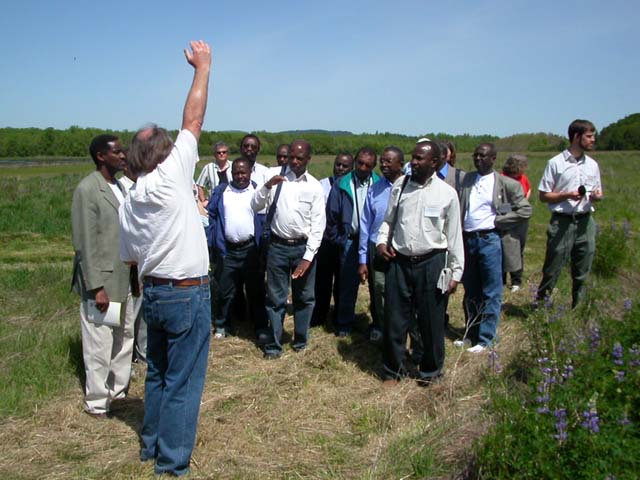- Nile Basin Study Tour: Managing Columbia
Waters: Local Level Perspectives
- Monroe & Corvallis, Oregon, USA
- April 30, 2004
-
 The
Nile Basin Initiative, a program that promotes economic
development in the basin and brings together stakeholders and
experts to explore issues of water use, power, trade and
environmental programs, collaborated with the U.S. Bureau of
Reclamation to bring water and power ministers from eight Nile
Basin countries on a tour of the Columbia River Basin. The
Universities Partnership hosted one day of the tour,
highlighting multiple levels of decision making by
focusing on two different spatial scales within the Willamette
Sub-Basin. To emphasize management issues at a local level, the Ministers were given a tour of the Raindance Ranch, owned by a
private landowners, and located on
Muddy Creek, a tributary of the Willamette Sub-basin, where
water quality and habitat restoration programs were underway. The
Nile Basin Initiative, a program that promotes economic
development in the basin and brings together stakeholders and
experts to explore issues of water use, power, trade and
environmental programs, collaborated with the U.S. Bureau of
Reclamation to bring water and power ministers from eight Nile
Basin countries on a tour of the Columbia River Basin. The
Universities Partnership hosted one day of the tour,
highlighting multiple levels of decision making by
focusing on two different spatial scales within the Willamette
Sub-Basin. To emphasize management issues at a local level, the Ministers were given a tour of the Raindance Ranch, owned by a
private landowners, and located on
Muddy Creek, a tributary of the Willamette Sub-basin, where
water quality and habitat restoration programs were underway.
At the ranch water practitioners for the state
of Oregon were invited to discuss various provincial level initiatives and
incentives supporting water cooperation, as well as discussing
legal frameworks and regional issues of conflict.
- Short talks were given, linking local, state and federal
initiatives. Oregon
Water Resources Department Senior Policy Coordinator Adam Sussman gave a presentation about
Oregon's system of water governance and working
through water conflict in Oregon. He was followed by Ken Bierly, the Deputy Director of the
Oregon Watershed Enhancement Board (OWEB), who spoke about The
Oregon Plan for Salmon and Watersheds, a state program which
provides incentives for private landowners to support water
quality. Steven P. Smith of
the U.S. Fish & Wildlife Service,
Willamette
Valley National Wildlife Refuge finished this section of the
day with a presentation about meeting international treaty
agreements for wildlife habitat. The morning was concluded
with a presentation by the owner of the ranch, Laurie Halsey, concerning
activities undertaken at Raindance Ranch for different endangered
species and overall landscape improvements for water quality.
In the afternoon the participants returned to
Oregon State University and met with OSU President Ed Ray and the
Dean of the College of Science, Sherm Bloomer. John Shurts, General
Counsel for Northwest Power and
Conservation Council, discussed building higher level
cooperation between the four US states which share the lower
Columbia and the Canadian states that surround the upper reaches, as
well as working with the two federal level administrations
concerning power and fish, and habitat, protection along the length
of this international river.
|

 The
Nile Basin Initiative, a program that promotes economic
development in the basin and brings together stakeholders and
experts to explore issues of water use, power, trade and
environmental programs, collaborated with the U.S. Bureau of
Reclamation to bring water and power ministers from eight Nile
Basin countries on a tour of the Columbia River Basin. The
Universities Partnership hosted one day of the tour,
highlighting multiple levels of decision making by
focusing on two different spatial scales within the Willamette
Sub-Basin. To emphasize management issues at a local level, the Ministers were given a tour of the Raindance Ranch, owned by a
private landowners, and located on
Muddy Creek, a tributary of the Willamette Sub-basin, where
water quality and habitat restoration programs were underway.
The
Nile Basin Initiative, a program that promotes economic
development in the basin and brings together stakeholders and
experts to explore issues of water use, power, trade and
environmental programs, collaborated with the U.S. Bureau of
Reclamation to bring water and power ministers from eight Nile
Basin countries on a tour of the Columbia River Basin. The
Universities Partnership hosted one day of the tour,
highlighting multiple levels of decision making by
focusing on two different spatial scales within the Willamette
Sub-Basin. To emphasize management issues at a local level, the Ministers were given a tour of the Raindance Ranch, owned by a
private landowners, and located on
Muddy Creek, a tributary of the Willamette Sub-basin, where
water quality and habitat restoration programs were underway.